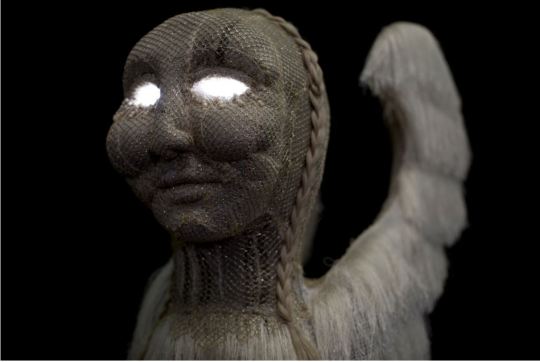#one of them is the pythia aka the priestess of delphi
Explore tagged Tumblr posts
Note
was thinking abt cassandra n apollo bc 💔 love them and yk its become even stranger to me how it’s treated as like. some failed romance of apollo’s all because he couldn’t take rejection. because it wasn’t ever really a rejection? like they both agreed to a deal, she just didn’t uphold her end. like consider how relationships were treated in the past as transactional, and this specific exchange being a trade for prophetic powers—can we really even consider the idea that there is any sexual/romantic attraction towards each other? of course i know there’s a mutual level of devotion, but i’ve personally interpreted it as a complicated relationship between a devotee, her faith, and her god. it’s something transcending sexuality or romance. and their failed trade is a lesson on expecting too much from the divine without yourself being fully committed to them. all i’m saying really is that i think watering their dynamic down to some rejection story is silly and ruins the religious symbolism like there IS a reason that she is his priestess before and after!
(also thinking abt it: the exchange is soo symbolic its actually driving me nuts. he gives part of himself to her and she gives part of herself herself to him in return. a god and a follower’s mutual devotion to one another.)
anon your interpretation is soooo based let relationships transcend the meaning of romance and sexuality fr fr
biting this ask. gnawing. anon u get me. they are soooo complex and can have soooo many GOOD interpretations and you are RIGHT that reducing them to a ~rejection~ story not only waters them down, but also CHEAPENS who they are and the culture they come from!
#LET THEM BE DEVOTED TO EACH OTHER. LET THEM BE THEIR CANON SELVES.#also if we wanna get more symbolic about this-#in a previous post i mentioned apollo's symbolic marriages#one of them is the pythia aka the priestess of delphi#a god and a mortal devoted to each other#sound familiar...? *eyes the above*#what's more is that. from what i can recall. wasn't cassandra like his MAIN priestess in troy? troy his MAIN city in anatolia?#making her the...i dunno...sorta pythia of troy? in a way?#like it's not a 1:1 and i could be missing some things BUT. the connection. is there.#it rotates in my mind frequently#the oracle speaks#asked and answered#anonymous#apollo#greek mythology#cassandra#cassandra of troy#greek gods#greek myths
14 notes
·
View notes
Text










And so my favourite Ancient Greek site ever; Delphi!!
This place (and, of course, the mythos behind the oracle of Delphi herself) has been a fixation for me for years, so I was buzzing basically the entire time I was there.
While everything I saw was beyond gorgeous, this place took the cake. An absolute trek up a mountain side (with a further trek if you wanted to see the Pythian stadium, which I happily did), but we'll worth it. Massive props to everyone and everyone who traveled from literally anywhere in order to get a prophecy.
Speaking of prophecy (info dump under the cut)...
Okay! So! Delphi, aside from being a temple of Apollo, was considered the centre of the classical Greek world (and just the world in general), for a long time, mainly because it was the seat of the Pythia; the high priestess, aka, the oracle of Delphi. Which, fun fact, in Greek shares the same root word for 'womb'.
Now, the temples (as well as the village, various treasuries, gymnasium and theatre) at Delphi are of varying ages, with the temple of Apollo being built around 7th century BCE, before being burnt down in 548ish BC, and then again in the 4th century BC. The ones which you can see (and are in the photos 😌) are all from the 4th century BC. Two thousand plus years old.
Isn't that insane? Sure, not the oldest thing in the world, but walked by so many people. Awesome, in the truest meaning of the word I fear.
But, onto the Pythia. For a bit of context, the original site of Delphi is believed to have housed a different God, suspected to be Gaia, who's son/daughter (varies depending on what translation of the myth you're reading into), named Python (sometimes called Drakon // Drakaina) resided in a cave. When Apollo took over the site, he killed it, and, when he did, it caused a great chasm to open up in the Earth and spew gas. Henceforth, the oracle was known as the Pythia.
She would've also sat on a tripod over this chasm, of which with inhalation of the gas, the spirit of Apollo could posses her in order to give prophecies.
It's been debated whether this chasm did or didn't exist—it is highly possible for one to have been there; the area is known for earthquakes, and natural gas that causes hallucinations, such as methane, ethane and ethylene is able to come from the ground—but, either way, the priestess was high as balls when giving these prophecies. Either from gas, laurel (known in the modern age as Oleander), or both.
So, imagine, you've been travelling from Athens to Delphi for a week or two, have waited a month to see this oracle, only to step into a dim temple to see a lady probably between 40-60 years old, dressed as a young woman, with visable gas spewing out from underneath her, and she spews what sounds like absolute nonsense, in which, very helpfully, a priest translates into poetry for you to take home, which turns out to be scarily accurate. I'd be damn sure the Olympians existed too.
Her being so accurate is, in fact, what brought Delphi such high prestige.
While the idea of living breathing oracle is very cool, the way Delphi was set up aided her being so precise. As noted before, Delphi was considered a hub (would've had street markets, banks, small villages, religious sects etc.), with almost everyone there to see the oracle—people would be waiting weeks to months for a visit from her—and, during this time, they'd interact and talk with those around them. War plans would be drunkenly shared, marriages would be quietly talked of, and most of these conversations between generals and kings, and their messangers and servants, were all heard and noted down by the various priests in the area, who'd provide information to the oracle, and slip in some more details in their 'translation'.
Interesting, no?
The oracle of Delphi is dates back to about 1400 BC, with her last prophecy being delivered about 390 CE, to a Roman Emperor who began stating various laws to end pagan (classical Hellenistic) activities.
#as in refering to 'her' I do mean like a TONNE of different oracles#once one would die another woman would be picked out from the local villages and she would continue the line of oracles#unfortunately there's no documentation (as far as I know) on how this was completed but it would be so interesting if we did#there was also!!!! Delphi dog!!!!#aka the big dude in the 9th photo#he followed me around and pranced happily among the ruins and I adored him#oh to be a stray well fed and loved by everyone around and prancing through ruins of a fallen temple#the museum was also super cool too#minus the Americans I ran into#while I'm here; American moots why are Americans seemingly so obsessed with the English accent?#mine isn't all too strong (I use bits of MLE/Cockney occasionally because I'm around people who speak with that accent often) but the ->#moment these girls heard me speaking it was like moths to a flame I swear#I have GAD and social anxiety so I was already a bit iffy but gosh they were loud#and they had the social skills of a carrot ☹️#asked if I was from London and then just over and over asking me to say certain phrases or how I said things compared to them#with mates I don't mind that but to a complete stranger. who is clearly a bit tired and overstimulated. please don't#I've had it a bit in London where Americans have asked me for directions and they've smiled and been pretty polite but that was. odd lmao#don't do that#for real lived up to the American stereotype to a T#it just really surprised me lol#mel's thoughts#mel's photos#delphi#greece#the oracle of delphi#greek mythology
20 notes
·
View notes
Text
Possible Inherited Abilities
Okay remember the ask I receive a super long time ago about if Regulus inherited his mother’s powers and I made a few theories. I liked them a lot so I decided to choose one theory and summarized it and make it better to understand because I am sure my earlier post was very disorganized. I have reblog the post multiple times and ask what people think about it and since nobody gave me feedback, I am just going to stick with this and if anyone decides to give feedback now (despite I reblog it multiple times before and ask), I am not going to change my headcanon. So this is a permanent headcanon, no changes. This is a headcanon explaining how and why Regulus is so overpowered. If you want to know more information or get a better understanding, you can read it in the original post here.
New Update: There is now canon information as to why Regulus is overpowered. Here is the post explaining why: https://eternalstarlights.tumblr.com/post/737834945228210178/why-regulus-is-powerful
I am still keeping this as a headcanon though.

Headcanon
Arkhes aka Regulus’ mother is a Pythia. Even though Regulus is not one, he does inherited some of his mother’s abilities. Here is some basic information on Pythias.
About Pythia
Pythia are high priestess or oracles that serve in the Temple of Delphi. Only woman were allow to be Pythia. In mythology, Pythia are known as the most powerful, prestigious and authoritative amongst the Greeks and are very well respected. They used to be the first servants of Gaia, the Mother Earth goddess. They have a connection with the Earth and its spirits. When Apollo took Delphos for himself, they later served Apollo. A pythia’s job is to serve the gods especially Apollo. Pythias can be compared to prophets. They can channel the power of a god (or Apollo’s power) and predict the future. They do this by doing a very exhausting ritual. The rituals are known to be very exhausting and have a physical effect on the health of the Pythia. Due to this, Pythia were known to die earlier than most women.
How do the Pythia fit into the Saint Seiya world?
Since we all know Saint Seiya doesn’t follow Greek mythology completely and is only inspired from it, there will be some information about Pythia that won’t be exactly the same as Pythia in mythology.
Pythia are oracles and are known to be wise and mysterious. They serve no humans but only gods especially Apollo.
Pope Sage has called Pythia the spokesmen of gods (not spokesmen of Apollo) in the Sagittarius gaiden, so the Pythia can channel any god’s power (not only Apollo) if they wanted. The Pythia still worshipped Apollo as their main god but they can also worship other gods too therefore they are spokesmen of gods.
Arkhes and the Pythia are powerful woman because their body is strong enough to be able to handle a god’s power when channeling it. The rituals help them call on whichever god, usually Apollo to channel his power through them so they can predict the future or get answers to questions humans can’t answer. They are always so tired after this because they had to handle huge cosmos. Normal humans won’t be able to do that and only Pythia could since they are very resistant. Yes, there are other people who could channel god’s power but because of circumstances such as seals with Athena’s blood, the sword with her blood, flower bracelet and when Athena was there in spirit form. Pythia are different since they can channel a god’s power without any help of holy objects and without the god being there either physically or in spirit form.
There had been other people not only women who can channel a god’s power but temple only allow women who has a strong talent and wants and choose to be Pythia. They have to be train before becoming a Pythia.
Pythia are like prophets. Yes, they could tell the future by channeling a god’s power but they can also perform miracles using god’s power if they needed to just like prophets. However, like prophets, they mainly only channel it to tell the future and answer questions humans can’t answer.
Since Pythia used to be servants for Gaia, the Pythia can also speak to nature and the spirits of nature too.
Also due to the duties of the Pythia, it was no surprise that Arkhes died giving birth to Regulus since her body was not able to deal with the stress of giving birth since her body has already been greatly weakened.
How does this all relate to Regulus
Let start in an order so first the gaiden. Regulus struggled to see and learn Celtic magic despite him trying his best to try to see it with his eyes. His eyes could only see the cosmos and how a person move and perform their attack, he couldn’t see anything beyond that. However, during the battle against Banshee Shelly, he was able to see and observe the principal of the world or essence of life despite not seeing and understanding it earlier. It was only when he saw the spirits, he was able to understand. Pythia has a connection to the Earth spirits and Regulus inherit the same ability to have the same connection and see the spirits. It is the same as his father speaking to the Earth and nature as his father was able to see the same thing. While a normal person would take months or years to see the spirits, Regulus saw the spirits quickly. Regulus had the talent but unlike his mother, father and Connor, he did not continue to practice or improve it since he had nobody to train him. His talent was at the bare minimum.
During the battle against Balor, Regulus performed Broniac, an attack that belonged to Lugh that was strong enough to defeat Balor. How could that happen? Connor is the descendant of Lugh and a priestess in practice. She was able to pray and awaken Lugh who was within the land of Ireland with her prayers and strong wishes to help Regulus become stronger and defeat Balor. Lugh unlike the Greek gods was a spirit and wasn’t physically there. Through Connor’s prayers, Lugh gave Regulus his power and Regulus unconsciously channeled his power. His plan was to defeat Balor with lightning plasma but as Regulus performed his signature attack, Balor saw that the attack/light divided into five rays that formed into a spear, Broniac. In that final moment, Regulus channeled Lugh’s power and was able to perform Broniac, an attack that only Lugh who is a god could use. So Regulus who inherited his mother’s ability to channel the power of a god was able to channel Lugh’s power. For a Pythia, they must do a ritual to call on the god but as for this case, Connor had already call on Lugh and Regulus just needed to channel the power.
Now onto the battle against Rhadamanthys. A Pythia would have a very strong body that is able to handle a god’s power when channeling their power. Regulus inherited his mother’s ability to handle strong cosmos. That was why Regulus was able to perform Athena Exclamation and Zodiac Clamation and only reach his limit after. Those attacks were powerful and require so much cosmos that a normal saint’s body should have reached a limit sooner than Regulus’ body would have.
Pythia are also known to have an immense amount of cosmos since they are powerful women who can channel the power of god. His mother had a lot of cosmos and Regulus inherit that from his mother. He was able to have enough cosmos to perform Athena Exclamation and Zodiac Clamation by himself.
Also since his father is the most powerful saint in his generation and his mother is a powerful Pythia, they would produce a child that is super powerful.
Those are the abilities Regulus inherited from his mother.
5 notes
·
View notes
Text
Day 4:
On my 4th day I visited an area called Delphi, which is a very well-known and famous archeological site that is situated on the slopes of Mount Parnassus. As I walk around I try to remember the things I learned about recently regarding this site and think back to another article I read on this topic. According to Britannia, the creation of Delphi can be found explained only Greek mythology. The Greek god, Zeus, sent forth two eagles, both from the East & West, and had them fly towards what the Greeks believe to be the center of the Earth (aka Delphi). I found this information to be interesting because it went on to say that the spot was marked by something called a ompalos and this object was later placed at the Temple of Apollo, which is where I intend to visit today. The Temple of Apollo is often associated with the oracle at Delphi who is also called the “Pythia”. The Pythia is known as the priestess of Apollo and would often deliver prophecies and advice within the temple whilst acting as a conduit between the mortal and divine realms. Out of all of the sites and temples I have attended so far, I am the most excited for this one as I hope to catch a glimpse of the priestess. As I get closer to the temple I see a diverse crowd forming outside of the temple hoping to get special insight from the oracle. People from all over the Mediterranean seemed to have gathered here and I can hear a few of them muttering about their personal issues that they’d wish to consult with the priestess. The topics range from mundane things like politics to dire things like warfare. As I wait impatiently in the heat for my chance to see her, I admire the doric columns that hold up the temple, for something that was made in 4 BCE it is a very grand and splendid structure that emphasizes the creative ability of those living in Delphi. As I’m lost in thought, I realize that the final group of people waiting to enter the building have finally been allowed to go in. As I head inside and wait around with the rest of my group, I see the Oracle of Delphi and she is absolutely stunning. She is wearing a long, flowing robe that is adorned with intricate patterns and symbols to showcase her status as a Pythia. Right now she is situated over a tripod within the inner chamber of the temple and she is positioned over a fissure in the earth from which intoxicating gasses are emerging, as she speaks incoherently the people around me listen intently and they’re convinced she’s in a trance-like state and that she is currently communicating with the divine realm. When I leave I think back to this experience and realize that even if some people find the Pythia to be utter nonsense, her role in this society is key to these people feeling hopeful and finding some semblance of peace and gratitude within their lives.

Source of picture: https://en.m.wikipedia.org/wiki/Temple_of_Apollo_(Delphi)
Source of information within this post: https://www.britannica.com/place/Delphi-ancient-city-Greece#ref240482
0 notes
Text
The Riddle of the Sphinx: 14x12 Prophet and Loss
First, thanks to @verobatto-angelxhunter @gneisscastiel @magnificent-winged-beast @emblue-sparks @mrsaquaman187 for inviting me to guest this week, as part of their ongoing SPN #Metafest project @metafest
along with several other guests: @bluephoenixrises @poorreputation @agusvedder @amwritingmeta @savannadarkbaby @prairiedust and
@norahastuff
I’m going to guest meta about the Riddle of the Sphinx.

Here is creepy Tony Alvarez drowning his first victim.
Despite an opening dose of Bucklemming torture-porn (ugh - although tbf there was a narrative point, as the drowned girl was a mirror for Dean, just like the slain first-born son and the dude who almost got barbecued were - more on that later...)... So, yeah, despite that, I was thrilled to see this in the visual narrative architecture - the Sphinx Machine Shop, where Tony does his mangled prophecy induced killing.

The Sphinx, as you know, is a fearsome part-woman, part winged-lion beastie, in Greek mythology, who was famous for guarding the entrance to Thebes and asking travellers to solve the answer to a riddle in order to gain safe passage to the city. If they failed, she devoured them.
She is tied in mythology not just to puzzles and their solutions, but to fate...
Here is the Sphynx of Naxos, from the Temple of Apollo at Delphi (560 BCE)

Image from https://en.wikipedia.org/wiki/Sphinx_of_Naxos
The Temple of Delphi was the site of the Oracle of Delphi, who was the High Priestess Pythia (a transferrable role) famous for her prophesies, which came to her in trance-states, supposedly from the God Apollo.
You see the link to SPN’s own Prophet role here....
The Sphinx also, famously, appears in Sophocles’ play Oedipus Rex, which became the basis for Freud’s also famous (and relevant a bit later) “Oedipus complex”. Sophocles didn’t invent the myth, but his telling is its most famous rendition.
Despite his other misfortunes, Oedipus doesn’t get devoured by the Sphinx, because he solves her riddle, a popular rendition of which is:
“What goes on four legs, on two legs, on three, and the more legs it goes on, the weaker it be?”
The answer, is - a human (baby, adult, old person with a stick).
Oedipus’ story is a classic story about fate, just like Appointment in Samara (re-worked in an SPN episode, 6x11, but originally an old Mesopotamian tale) which @mittensmorgul and I were talking about just recently, in relation to themes of fate vs free will in SPN (specifically in relation to the role played by Death - see here for the discussion:
http://drsilverfish.tumblr.com/post/182454009599/mittensmorgul-drsilverfish-mittensmorgul )
Oedipus’ story is a (f-d up) family drama - rather relevant to our very own Family Winchester [no, NOT because this is all about either of the boys wanting to sleep with Mary Winchester - thanks Dr. Freud - although, come to think of it, Dean did say she was hot in 4x03 In The Beginning :-)]

14x13 Lebanon promo shot
When baby Oedipus is born, his father King Laius receives a prophecy that his son will grow up to kill him, and so, he sends a shepherd to expose the baby on the mountainside to die, before that can happen. The shepherd however, not being an asshole, saves the baby, and raises him secretly as his own.
Oedipus grows up, and he eventually learns from the Oracle at Delphi herself (see above) that he is fated to kill his father and marry his mother. Believing the shepherd and his wife are his true mother and father, whom he loves, he leaves his home in the mountains for the city of Thebes, determined to defy the prophecy.
On the way, he meets a quarrelsome old man on the road, they fight, and Oedipus kills him:
When he gets to Thebes, he finds the King has been slain, by persons unknown, and the town is at the mercy of the Sphinx. Oedipus, by guessing the Sphinx’s riddle, obtains safety for the town and is, in gratitude, appointed King himself and given the widowed Queen, Jocasta’s, hand in marriage.
All is well for a bit, until a plague descends on Thebes, and Oedipus is told that to save the city, he must avenge King Laius’ death. So, he goes sleuthing, with the extremely relucant help of his seer Tiresius, and to his horror, discovers that he is the one who killed the King (that old dude on the road to Thebes all those years ago), that he is the King’s true son, and has, therefore, killed his father and, in marrying Queen Jocasta, married his mother and committed incest, fulfilling the prophecy he set out to escape from. He promptly blinds himself in horror. Poor ancient Greek dude.
The Chorus laments the power of fate
O heavy hand of fate! Who now more desolate, Whose tale more sad than thine, whose lot more dire? O Oedipus, discrowned head, Thy cradle was thy marriage bed;
http://www.gutenberg.org/files/31/31-h/31-h.htm - Project Gutenberg translation of Oedipus Rex.
A reference to the story of Oedipus and the Sphinx is extremely pregnant right now in the SPN narrative, for two reasons:
1) Fate vs Free Will
2) The Ghost of John Winchester
1) Fate vs Free Will
Dean thinks his interpretation of the book Billie handed him in 14x10 Nihilism - apparently the only death of his in which AU!Michael doesn’t take over his meat-suit and burn the world - means he has to sink himself to the bottom of the ocean, in the Ma’lak (angel) box and that’s “fate”.

Like Oedipus, there is no escape.
However, 14x12 tells us two things. Firstly, by analogy - the prophecy is wrong. Alvarez thinks he is carrying out the prophetic Word of God TM by recreating a twisted version of the Plagues of Egypt sent by God in Exodus:
1) The slaughter of a first-born son
2) Drowning in the Red Sea
3) Fire out of Heaven
(all of which are mirrors for what Dean thinks is his “fate” right now: death of a first born son; being drowned forever at the bottom of the ocean in the Ma’lak box; being consumed by the AU Archangel Michael’s Heavenly grace/fire).

But it’s a garbled message, received as a result of Prophet Donatello’s comatose scramblings.
Secondly, screw prophecy - against the odds, Dr. Sexy of the Lord (yeah - you know Dean thought it) is able to revive Donatello, thus preventing further scramblings (aka wrong prophesies).
CASTIEL: “Dean - if there is a spark, a hope, then I have to try.... you taught me that!”

I loved that line, with its resonance all the way back, like a skein of blue grace, to the Apocalypse Mark One, when Dean convinced Castiel, in Zacharia’s (also due to return in 14x13 Lebanon) “green room” in 4x22 Lucifer Rising, to disobey Heaven for the sake of humanity (Yes, Dean, an angel did fall for you...).

In other words, just as the Winchesters beat their “fate” to be “angel condoms” for Michael and Lucifer last time around, by “tearing up the script” and “making it up as they go” (4x22 Lucifer Rising) thanks to the help of rebel angel Castiel, so they can do so again.
2) The Ghost of John Winchester
In the SPN world’s worst kept spoiler, we know John will return next week in 14x13 Lebanon. We’ve been meta’ing about the ghost of John Winchester haunting the SPN narrative for... forever.
Here is some meta of mine on the subject from S12:
http://drsilverfish.tumblr.com/post/158388550099/john-winchesters-ghost-and-the-haunting-of-s12
John is explicitly recalled, during the brothers’ (beautifully rendered) car conversation in 14x12:

DEAN: “You ever think about when we were kids?”
SAM: “Maybe, yeah, sure, sometimes, why?”
DEAN: “I know I wasn’t always the greatest brother to you.”
SAM: “Dean, you were the one who was always there for me. The only one. I mean, you practically raised me.”
DEAN: “I know things got dicey, you know with Dad, the way he was... and I just.... I didn’t always look out for you the way that I should of. I mean, I had my own stuff, y’know, and in order to keep the peace, it probably looked like I took his side quite a bit. Sometimes, when I was away, you know it wasn’t cos I just ran out, right? Dad would, he would send me away, when I really pissed him off. I think you knew that.”
SAM: “Man I left that behind a long time ago, I had to.”
AU!Michael, I’ve been arguing since the start of the season, is a mirror for Dean’s self-repression and for John Winchester. See:
http://drsilverfish.tumblr.com/post/179463975289/shirtlesssammy-14x03the-scar-meta-writers
John was one of the major causes of Dean’s self-repression, as illustrated in the convo above, where it’s clear Dean had to grow up too fast to become a substitute-parent to Sam, where he was often obedient to their father to “keep the peace”, and where he was also often, unreasonably, punished by his father in the process (such as, as we already know, when he was sent to Sonny’s after stealing food for Sam in 9x07 Bad Boys).
According to psychoanalysis, we always internalise psychological constructs of our parents - Freud calls them imagos. So the Riddle of the Sphinx, for Dean, is how to kill (or rather, lay to rest) the ghost of his father (whom AU! Michael is a mirror for) and with it, the self-repression which has wounded him so much, psychically, since childhood, without letting it kill him too.
Nick, of course (general shudder) also serves as a John Winchester mirror in the episode - his obsessive revenge quest for the slaughter of his wife (aka mirror Mary Winchester) by Abraxas, led to something she never wanted - damage to innocents along the way (aka mirror innocents, Sam and Dean).
To Conclude
The answer to the Sphinx’s riddle, the one that helped Oedipus avoid being devoured by her was.... humanity.

Light Sphinx, 2015-2016, Mixed media (inc. foam, hand stitched fabrics, LEDs, beads, synthetic hair), 74 x 32 x 54 cm by Tarryn Gill
https://tarryngill.com/Light-Sphinx-Shadow-Sphinx-2015-16
Dean IS the symbolic representation of humanity (which is why Amara was so fascinated by him, and let’s not forget Metatron’s words about Castiel in 9x22 Stairway to Heaven - “He’s in love with.... humanity”).
Our first-born Winchester son just has to believe what this episode showed him - prophecy can be wrong.
His “fate” - to die, to drown forever, to be consumed by holy grace/fire, to remain trapped by the ghost of his father, by his own self-repression, by AU!Michael, by the Ma’lak box (aka, in subtext, the closet) is NOT the “Word of God”.
And killing one’s father doesn’t (as it did for Oedipus) have to mean damnation, if, the way one does it, is symbolically, by laying his ghost to rest in one’s heart and mind (hello upcoming SPN 300 14x13 Lebanon).
Freud believed the resolution of the Oedipus complex (for boys) was identification with the father (and no, we don’t have to concur with Dr. Freud). Dean has actually been on an oppositve journey, to get out from under his father’s shadow.
The Jungian solution, which the S14 narrative is offering to the metaphorical Riddle of the Sphinx, is, to turn around and embrace the Shadow-self (the parts of oneself one has repressed) and in so doing, to evolve - to become more fully human.
So, a final salute to Jerry Wanek and team, and the ever wonderful SPN set dressing narrative, for The Sphinx Machine shop!
NB:
You can read my Jungian Meta series here, if you’re interested:
http://drsilverfish.tumblr.com/post/180906003584/the-shadow-14x08
http://drsilverfish.tumblr.com/post/181122764984/14x09-the-spear-jungian-decoder-ring-edition
http://drsilverfish.tumblr.com/post/182299438269/jung-and-deans-journey-towards-self-integration
And if, you want to read more of my SPN meta in general, go visit my blog and look under the “Meta” sidebar tag: http://drsilverfish.tumblr.com/tagged/Meta
Plus, if you want to read lots of other people’s fabulous SPN meta, go check out the “SPN Meta” sidebar tag: http://drsilverfish.tumblr.com/tagged/SPN%20Meta
Thanks for having me @metafest !
DrSphinx out.
#Supernatural#SPN meta#Metafest#14x12#Prophet and Loss#Winchester Family Dynamics#Dean vs repression#Fate vs Free Will#Set dressing narrative#Jerry Wanek#SPN spoilers#Meta
142 notes
·
View notes
Text
Pythia, The Oracle of Delphi

With Apollo being a God of truth and prophecy, he was sought after by the people of Greece for guidance and because of this, many temples were built in his name. ☀️
The majority of women in Greece led predominantly domestic lives and were excluded from public life with the exception of participating in religious rituals or deity work.
To become a High Priestess was a prestigious honor. However, no honor was greater than to be the Pythia of Apollo aka the Oracle of Delphi.

Once a year, the Oracle of Delphi acted as a mouthpiece for Apollo and would enter a chamber called an adyton. This chamber was fumigated with burning barley meal and laurel leaves. Some researchers also believe that natural volcanic fumes and hallucinogenic gases rising from a crack in the ground would have been influencing the Pythia's dream like trance.
In exchange for offerings, the Pythia would offer crpyic messages on behalf of Apollo that the people would have to decipher for themselves.
"The Oracle also told the Athenians that a wall of wood could protect them. They did what she said and flew the city, and created their wall of wood on the water with their boats, winning that battle, but it was hopeless for the Spartans. The Pythia told the Spartans before the battle of Thermopylae (in the words of Herodotus):
"Hear your fate, O dwellers in Sparta of the wide spaces;
Either your famed, great town must be sacked by Perseus' sons,
Or, if that be not, the whole land of Lacedaemon
Shall mourn the death of a king of the house of Heracles,
For not the strength of lions or of bulls shall hold him,
Strength against strength; for he has the power of Zeus,
And will not be checked until one of these two he has consumed."
Every last Spartan who fought in the battle that the Oracle foresaw as doomed died, making even the most stubborn of people become believers of the Pythia's powers."
The Oracle of Delphi's prophecies were no small matter to the Greeks. The accuracy of her prophecies was enough to insure that the ancient Greeks would never make an important decision without consulting the Oracle.
Here is a link to more prophecies given by the Oracle of Delphi including her last cryptic message about Apollo.
1 note
·
View note
Text
Really LONG CHARACTER SURVEY. RULES. repost, don’t reblog !! TAGGED. no one in particular. TAGGING. anyone and everyone.
BASICS.
FULL NAME : rosemary ayana NICKNAME : rose, little mother AGE : 19+ BIRTHDAY : april 22nd ETHNIC GROUP : mistrali NATIONALITY : mistrali LANGUAGE / S : fluent in the common tongue, modern standard mistrali, and her hometown’s dialect. she can hold a basic conversation in vacuoan. SEXUAL ORIENTATION : bisexual ROMANTIC ORIENTATION : heteroromantic RELATIONSHIP STATUS : interested in a few people, casually dating someone. SOCIOECONOMIC CLASS : middle/upper. HOMETOWN / AREA : mistrali temple dedicated to her faith, her mother’s estate CURRENT HOME : shade academy PROFESSION : student / hunter / priestess in training
PHYSICAL.
HAIR : black, with subtle brown and gold highlights. it skims her mid-back in length. EYES : gold. NOSE : long and narrow, close to the roman type. FACE : heart-shaped. LIPS : she has them. COMPLEXION : dark. BLEMISHES : none. SCARS : none. TATTOOS : a leafy vine, curving under and around her left breast. see here for reference. another tattoo is in the works -- leaves on a breeze, along the right side of her ribcage. HEIGHT : 5′10″ WEIGHT : hovers around 140 lbs. BUILD : hourglass body shape. lean muscle. NOTABLE FEATURES : left nostril and both ears pierced. ALLERGIES : none. USUAL HAIR STYLE : outside of the training area, the front strands of her hair are twisted and tied at the back of her head -- see here for reference. while training or in deep concentration, her hair is twisted into a bun or tight braid. USUAL FACE LOOK : contemplative and quick to change to a slight smile. USUAL CLOTHING : a crop top, underneath a sleeveless shawl that can be refolded into a scarf wide enough to cover her head and shoulders. billowy pants tucked into sturdy dark boots. a gold ribbon serves as a belt, with another sash tied around her waist. it hides pouches, one of which holds a holy symbol. her piercings are small studs or hoops.
PSYCHOLOGY.
FEAR / S : losing her family, particularly her twin. not living up to expectations, even if they’re her own. losing her connection to her patron deity. ASPIRATION / S : to learn as much as possible from shade academy. to better herself, body and soul. to be able to shoulder peoples’ burdens and hopes, helping them achieve their goals, realize their potential, and move forward. in short, to make a difference -- however small. POSITIVE TRAITS : extroverted. friendly. curious and willing to learn. adaptable. humble. highly motivated. compassionate. empathetic. bold. NEGATIVE TRAITS : intrusive with a tendency to accidentally lecture. mischievous. deceptive. insecure. has a tendency to be messy aka an organized mess. conflict-averse whenever possible. MBTI : esfp-a. ZODIAC : taurus. TEMPEREMENT : sanguine. SOUL TYPE / S : spiritualist (15). leader (14). caregiver (13). ANIMALS : deer. VICE HABIT / S : partying. casual relationships. spending on spoiling her friends and/or those in need. scandalous novels and dramas.
FAITH : spiritual and ancestral worship. GHOSTS ? : yes. AFTERLIFE ? : yes. REINCARNATION ? : yes. ALIENS ? : why not. POLITICAL ALIGNMENT : as a budding public figure, she aims to stay as publicly neutral as possible. she does, however, fiercely believe in faunus rights and equality for all. ECONOMIC PREFERENCE : not sure about preference, but she’s working on limiting her spending. she’d like to eventually be in a comfortable economic position that allows her to be as philanthropic as she can. SOCIOPOLITICAL POSITION : see political alignment. EDUCATION LEVEL : meets the mistrali standards of education, under the tutelage of her temple’s dedicates. she considered attending a university in lieu of shade academy and would still do it after graduation.
FAMILY.
FATHER : ashoka ayana ( estranged ) ; aarush ayana ( legal father ) MOTHER : melia laskaris ; anise ayana ( legal mother ) SIBLINGS : parsley ayana ( oldest brother ). sage ayana ( twin brother ). thyme laskaris ( youngest brother ). five cousins that were raised as her siblings. EXTENDED FAMILY : aella and melanippe laskaris ( maternal grandmothers ). anise and ashoka’s two sisters. NAME MEANING / S : rosemary refers to the herb as well as its latin name, translated as ‘ dew of the sea ’. ayana has its origin in sanskrit and translates to ‘ movement ’, ‘ walking a road/path ’, and ‘ going/advancing ’. INSPIRATION ? : the pythia / oracle of delphi.
FAVORITES.
BOOK : her faith’s religious and historical texts. a certain scandalous genre. MOVIE : any chick flick or romance film. she watches anything from those genres when she needs to take her mind off other things. 5 SONGS : she has a fondness for religious hymns / chants, her twin performing traditional mistrali music, and club / dance music.
DEITY : her patron. HOLIDAY : festivals dedicated to her patron. solstice celebrations. MONTH : any in early fall. SEASON : early spring / fall. PLACE : her aunt’s estate / anywhere her team is. WEATHER : a crisp fall day / the aftermath of a downpour. SOUND : her brother’s sitar. SCENT / S : the crisp fall air. petrichor. spices. old books. candles. incense. TASTE / S : fresh produce. spicy food. FEEL / S : plant leaves. the soft warmth of candles. the breeze off the ocean. ANIMAL / S : no preference. NUMBER : no preference. COLORS : light blues, cream, gold, burgundy.
EXTRA.
TALENTS : dance, both modern and traditional mistrali. kickboxing. BAD AT : cooking. TURN ONS : spontaneity. kindness. willingness to try new things. thoughtfulness. humor. TURN OFFS : selfishness. inflexibility. being small-minded. HOBBIES : see talents. TROPES : tba. AESTHETIC TAGS : tba. QUOTES : (1) “ despite it all–yes, despite everything, in the face of nothing–we still consider ourselves revolutionary. we remain that most hopeful of creatures (…). " (2) “ she questions her existence, her humanity. is she a woman? a weapon? a god? ” (3) “ gold runs in our blood. ” (4) " hide in your forehead the star you sought to find in mourning. and with this star go on to feel pain above humanity’s pain. you always know more. and because of this you are worthy. " (5) " holy places are dark places. it is life and strength, not knowledge and words, that we get in them. holy wisdom is not clear and thin like water, but thick and dark like blood. " (6) “ always remember that faith sprung from a barren branch. that light has no fear of darkness. above all, that strength lives in an open heart. ” (7) " all these soft, warm nights going to waste when i ought to be lying in your arms under the moon. "
FC INFO.
MAIN FC / S : deepika padukone ALT FC / S : none. OLDER FC / S : none, but searching. YOUNGER FC / S : N/A VOICE CLAIM / S : none, but searching. GENDERBENT FC / S : N/A
0 notes
Text
Team finds world′s oldest intact shipwreck in Black Sea | News | DW
The British-ledteam, which has been scouring the sea floor off Bulgaria for the past three years, on Tuesday said it had found a 2,400-year-old Greek ship intact on the sea bed.
Carbon dating was used to confirm the vessel’s age, and that it was the oldest known intact shipwreck. The wreck was found at a depth of more than 2,000 meters (6,500 feet) where the water has no oxygen — meaning that organic material can be preserved for thousands of years.
youtube
The design used to construct the ship was previously only seen in pictures on Greek pottery.
Team leader John Adams, from the University of Southampton, said researchers could learn a lot from the find.
“A ship, surviving intact, from the Classical world, lying in over 2 kilometers of water, is something I would never have believed possible,” Adams said. “This will change our understanding of shipbuilding and seafaring in the ancient world.”
New search methods
The team, which includes British, Bulgarian, Greek, Swedish and US marine researchers, used geophysics, sediment core sampling and underwater exploration to study changes in sea level after the last ice age.
Read more: Australia’s first submarine found after vanishing in WWI
The project has taken three years and used technology — including specialist deep water camera systems — that was only previously available to oil companies. The researchers discovered some 60 shipwrecks in all, including a 17th century Cossack raiding fleet and Roman trading vessels loaded with amphorae — pot containers used to carry goods.
An early Bronze Age settlement was also found near to former shore of the sea.
Travel tips for fans of archaeology
A window into the past
Sometimes the earth reveals them voluntarily, sometimes they are found by chance and often they are searched for – archaeological riches. Excavation sites around the world offer fascinating insights into the origins of our cultures.
Travel tips for fans of archaeology
Terracotta Army, China
Farmers came across a clay figure while working near Xi’an in 1974. Their discovery was a sensation. They had stumbled upon the mausoleum of the first emperor of China: Qin Shihuangdi, who died in 210 BC. Since then, thousands of life-size terracotta soldiers have guarded the tomb of the ruler. With about 100 square kilometers, the imperial tomb is the largest excavation site in the world.
Travel tips for fans of archaeology
Angkor Wat, Cambodia
240 kilometers (149 miles) northwest of the capital Phnom Penh, in the middle of the jungle, lies the enchanted temple complex of Angkor Wat – part of a medieval city of millions, ornately built from sandstone. 150 years ago the French colonial rulers discovered the sunken empire of the Khmer, who once lived here. The stone reliefs on the temple walls tell their story.
Travel tips for fans of archaeology
Machu Picchu, Peru
The old Inca town of Machu Picchu was once only accessible on foot via a steep path. It is situated 2,360 meters (7743 ft.) up in the Andes. Not even the Spanish conquerors advanced to this point. The terraced city was only discovered about one hundred years ago. Built in the 15th century, it is regarded as an impressive example of the high culture of the Incas.
Travel tips for fans of archaeology
Uxmal, Mexico
3000 years ago the Maya founded settlements all over Central America. Especially on the Yucatán peninsula in Mexico. Uxmal is considered one of the best preserved Mayan sites. In the center of the city: the Pyramid of the Magician, 38 meters (125 ft.) high. This Mayan sanctuary took 300 years to build. As tempting as it is, you are not however allowed to climb up it.
Travel tips for fans of archaeology
Pompeii, Italy
The eruption of Vesuvius in the Gulf of Naples in 79 AD was devastating. The ash rain buried the city of Pompeii and its inhabitants. After their corpses had decomposed, cavities remained, which were later filled with plaster by conservationists. The plastic plaster casts of people in mortal fear leave no visitor to the excavation site untouched.
Travel tips for fans of archaeology
Troy, Turkey
German archaeologist Heinrich Schliemann was obsessed with Troy. At the end of the 19th century he began digging in the Turkish province of Çanakkale. His guide was the Iliad, the account of the Trojan War by the Greek philosopher Homer. Schliemann actually found a settlement. An important center of the Bronze Age, but whether it is actually Troy remains unclear to this day.
Travel tips for fans of archaeology
Delphi, Greece
When you hear Delphi, you immediately think of the oracle of Delphi. The city was founded in the 7th century B.C. and was the center of the world for the people of antiquity. A place of pilgrimage for kings and all who sought advice. It was given to them in the temple of Apollo, by the priestess Pythia – the oracle of Delphi.
Travel tips for fans of archaeology
Forum Romanum, Rome, Italy
Researchers suspect that almost 2000 ancient cities are located on the territory of the former Roman Empire. Every Roman settlement had a center with temples, administrative buildings, shops and public squares – the so-called Forum. The Forum Romanum was more than that, it was the center of the entire Roman Empire. It is still one of the most important excavation sites of ancient Rome.
Travel tips for fans of archaeology
Pyramids of Giza, Egypt
They are located near Cairo and are over 4,500 years old. Built as tombs for the Pharaohs Menkaure, Khafre (Chephren) and Khufu (Cheops) (from left to right), after whom they are also named. Although researchers have examined the inside of the pyramids with the most modern technology, the hidden chambers and galleries still keep their thousand-year-old secrets to this day.
Travel tips for fans of archaeology
Petra, Jordan
First you pass through a narrow gorge, then you can see monumental temples carved into the rock. Many caravan routes led through the capital of the Nabataeans, which had its heyday as a trading center from the 5th to the 3rd century BC. T.E. Lawrence aka Lawrence of Arabia raved about Petra as “the most wonderful place in the world”. To this day, the desert city enchants its visitors.
Travel tips for fans of archaeology
Cave of Lascaux, France
Deer, aurochs and horses – these are the best preserved prehistoric paintings in Europe, discovered in 1940 in a cave near Montignac. They are said to have originated 17,000 years BC. The cave is now closed for conservation reasons. However, visitors can admire the works of art by their ancestors in a perfect reproduction of the cave.
Travel tips for fans of archaeology
Stonehenge, England
The megaliths near Salisbury date from the Neolithic Age and are probably the most famous stone circle in the world. Their purpose remains a mystery: cult site, temple complex, observatory? Some stones are aligned with the summer solstice. At the equinox of the day and night, thousands of people still celebrate the sunrise in this mythical place.
Author: Anne Termèche
rc/msh (dpa, AFP, AP)
Each evening at 1830 UTC, DW’s editors send out a selection of the day’s hard news and quality feature journalism. You can sign up to receive it directly here.
document.addEventListener("DOMContentLoaded", function (event) { if (DWDE.dsgvo.isStoringCookiesOkay()) { facebookTracking(); } }); function facebookTracking() { !function (f, b, e, v, n, t, s) { if (f.fbq) return; n = f.fbq = function () { n.callMethod ? n.callMethod.apply(n, arguments) : n.queue.push(arguments) }; if (!f._fbq) f._fbq = n; n.push = n; n.loaded = !0; n.version = '2.0'; n.queue = []; t = b.createElement(e); t.async = !0; t.src = v; s = b.getElementsByTagName(e)[0]; s.parentNode.insertBefore(t, s) }(window, document, 'script', 'https://connect.facebook.net/en_US/fbevents.js'); fbq('init', '157204581336210'); fbq('track', 'ViewContent'); } Source link
The post Team finds world′s oldest intact shipwreck in Black Sea | News | DW appeared first on Today News Stories.
from WordPress https://ift.tt/2O1kdlU via IFTTT
0 notes